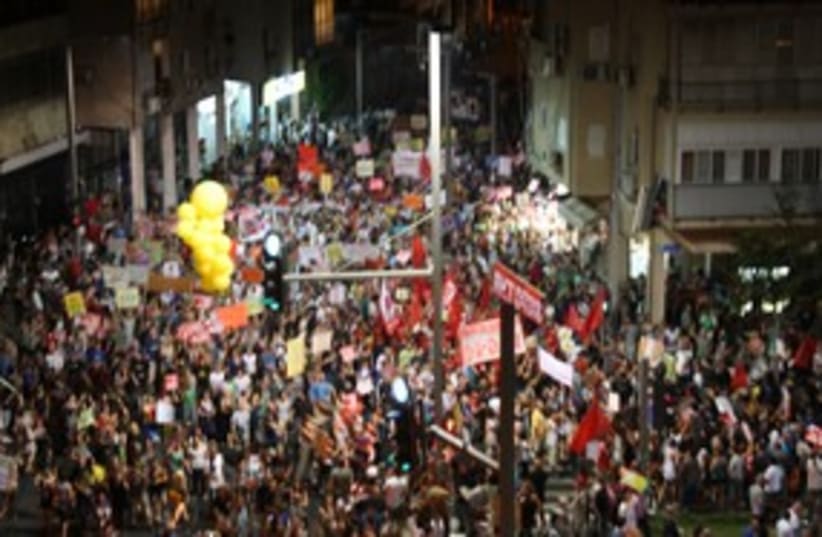Saturday's event in [Tel Aviv] will determine the character of our society: Will it remain comatose, submissively accepting the injustice that has pervaded it, or will it rise up in tenacious struggle?If Saturday night determined the future character of Israeli society, one thing is clear: it will be tenacious. It will be a society which refuses to be pushed around by its government, for on Saturday night Israelis rose up in historic numbers, refusing to submissively accept the economic and social injustices against which they have been fighting for eight consecutive weeks.RELATED:Where will the money come from?The social justice protest leaders, aware of the significance of the moment, were explicit in marking it as a transformational one. National Student Union Chairman Itzik Shmuli, one of the protest leaders, addressed Prime Minister Binyamin Netanyahu directly before hundreds of thousands of chanting citizens, saying:
Mr. Prime Minister, the new Israelis have a dream and it is simple: to weave the story of our lives into Israel. We expect you to let us live in this country. The new Israelis will not give up. They demand change and will not stop until real solutions come.The new Israelis. It was a phrase repeated over and over. These new Israelis who were awakened by the act of just one eight weeks ago, when Daphni Leef, unable to afford her apartment, chose to set up camp along Rothschild Boulevard in Tel Aviv as an act of civil disobedience. Eight weeks later, Leef's single act of civil disobedience had awoken something dormant within her country, something historic in her country, prompting record numbers to join what protesters now call המאבק – the struggle.These new Israelis have given the youthful protest leaders the social and political capital they need to enter the political area and effect monumental changes in Israel's economic and social structures - with smaller segments hoping to also change Israel's geopolitical stances.The new Israelis are fighting to give all of Israel's citizens equal opportunities and equal treatment under the law. Jews. Arabs. Immigrants. Druze. Bedouin. The poor. The shrinking middle class. The vulnerable. At their core, these protests have been about a fairer distribution of wealth in Israel. They have been about enacting economic reforms that would give all Israelis access to affordable housing, health care, education and fair wages. However, over time, the movement has expanded and morphed, with a cacophony of voices adding their own demands, from Arabs calling for fairer democratic treatment to leftists demanding an end to the occupation to political activists dreaming of a less militaristic society.It's a movement that has inspired Israelis to set up Tahrir-style tent encampments across the country. It's a movement that has inspired them to block traffic by dancing in the streets, to encircle Prime Minister Binyamin Netanyahu's residence, to camp before the Knesset. It's a movement that has brought working parents into the streets. Dairy farmers into the streets. Jews and Arabs, together, into the streets.On Saturday night in Haifa, nearly 40,000 people marched, focused on the issue of discrimination against Arabs. Shahin Nasser, representative of the Wadi Nisnas protest tent in Haifa, said:
Today we are changing the rules of the game. No more coexistence based on hummus and fava beans. What is happening here is true coexistence, when Arabs and Jews march together shoulder to shoulder calling for social justice and peace. We've had it. Bibi, go home. Steinitz, go and don't come back, Atias, good-bye and good riddance. As seen in Haifa, this is a movement willing to tackle many of the domestic injustices that exist in Israel. And while protest leaders have not, and will not in the near term, include any geopolitical issues in the current struggle, Leef – the symbolic leader of this movement who began everything eight weeks ago – spoke in severe terms that approached the broader political issues. Before a largely silent crowd hanging on her words, Leef slammed what she termed as government attempts to take advantage of the terrorist attacks and rockets from Gaza in weeks past to silence the protests. And, perhaps in her riskiest statement, she said this regarding Israel's militarism:I'm 25 years old. What are my biggest memories of this country: the 2nd Lebanon War, the period of terrorism, friends who were killed then, the assassination of Rabin, Gilad Shalit. And that's even without going into that I'm a 3rd generation Holocaust survivor. This was my consciousness. Moments and memories laced with death, loss, pain, fear, and the feeling that everything is temporary.
At the demonstration in Afula I saw a sign: "For 31 days I have been proud to be Israeli." I stand before you and I am now proud to be an Israeli for 7 weeks.How far this movement will expand is a great unknown, for it is already entrenched in a fight on multiple economic and social fronts. But Leef's words intimated that a fight against militarism is also a part of her personal struggle – and her personal struggle right now has more symbolic weight than that of anyone else currently protesting in Israel.After last night's massive rallies, the protesters are ready to shift tactics, to end the mass protests and enter more explicitly the political arena in order to effect social and economic changes. Many of the tents will be coming down, and protest leaders will turn their own tents into community centers and meeting places, where further strategies can be developed. What happens next week, next month or next year is anyone's guess.But what has already occurred is crystal clear. A new Israel is rising.The writer is the author of Shrapnel: A Memoir.
